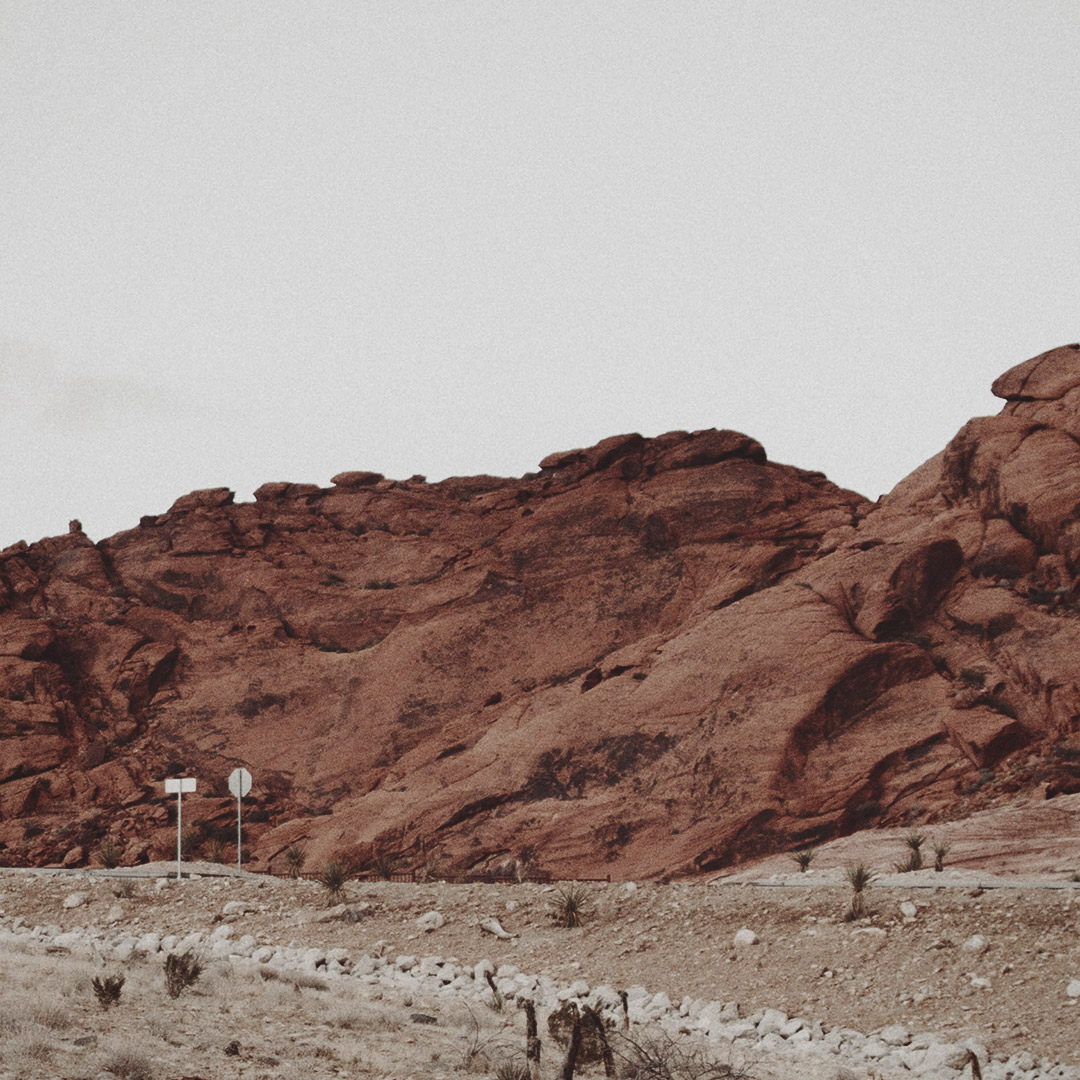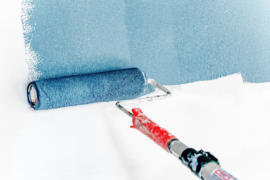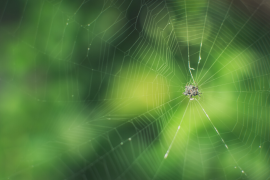When he gets better, Jeffrey Stacker says he’s going to visit Waco, pay his respects to Koresh’s fight against the Feds. He fires another shot at the computer parts we’ve lined up on a half-burned pallet. The revolver’s report echoes across the desert in jammy reverberate. None of the targets explodes into brilliant arcs of plastic. Stacker sighs. No, he says, he’s going to move to Montana. He’ll live on a ranch. Maybe join a militia. He likes the quiet.
This is not how I expected our day to go.
Stacker’s bald head looks like an ostrich egg, like the pale belly of some creature overturned. He’s been inside all summer. His skin has gone to milk. The chemo drugs have ravaged him. He fires again, and there’s a puff of dust on the ridgeline behind. The sun hovers overhead.
We’re hemmed in by these low, smooth hills, the eroded architecture of what was once an ancient seafloor. Formerly jagged coral outcrop, now humps and mounds that look from certain angles like naked bodies, tanning. This place is called Split Mountain. We took a dirt road here. Before that a narrow highway bent for many miles across the starkness of California desert. Before that there were fringes, places barely more than grids for telephone poles. And before that there were towns, with people. Stacker lived in one of those.
I’d gone to visit him that morning. It’d been a year since I’d seen him last. Maybe a bit longer. He opened the door and stared at me. I could see into the house and saw a dim place, bedsheets tacked over the windows. It smelled almost animal, like many dogs lived there, yet nothing moved. I hugged my friend and he felt very thin in my arms.
“We’re going shooting,” he said.
This was exciting. I’d braced myself for oblivion, for sitting around stoned, watching documentaries on fascist history and alien abduction. I knew Stacker was convalescing after an illness. I expected perhaps the outside world would be overbearing for him yet. It had been a long time since I’d trusted myself with bullets.
He lived with two roommates. I’d met them before and remembered towheaded men with sharp cheeks. One of them worked long hours at a data farm, and the other had broken himself to pieces crashing a motorcycle and was a convalescent too. Stacker told me in a low voice how they’d become enemies, himself and the other sick man.
“You get paranoid,” he said, “when you’re on the drugs. It’s just this gloomy headtrip. I’d sit on my bed and say evil things through the walls.”
His final session of chemotherapy occurred the week before. He told me about the port left in his chest. A circular dock, maybe the size of a quarter, below his left clavicle. An intravenous catheter. It made him seem like a test subject.
“It goes right into your heart,” he said. “The stuff they’re pumping into you is so strong it’ll just melt your veins.”
“When does it all come out?” I asked.
We stood in the kitchen. I drank water from a glass that tasted vaguely of pyrite.
“When they know I’m better,” he said. He stuttered pronouncing the word better.
I heard movement elsewhere in the house. A door groaning, uneven footfall across a hallway. It was the other roommate. Stacker leaned in very close.
“Maybe this was a hallucination,” he said, “but I remember standing over him, holding a gun. He was asleep. That’s all I remember, just one frame of a memory. I wasn’t pointing it at anyone, just holding it.”
I put my hand to Stacker’s shoulder. He shivered like a fern.
“Let’s go shooting,” he pleaded. “I need to get out.”
***
So it came that I drove Jeffrey Stacker, lymphoma survivor and blistered convert to conspiracism, fifty miles across the desert. He’d hauled a sagging cardboard box of obsolete computer parts from a shed in his backyard and it rested like an actual passenger upon the rear seat of my truck. I noticed a bitter smell of old plastic and dust. Some broken piece of microchip rattled softly as we passed from bad roads to worse. Stacker cleaned his revolver. He held it to the window in admiration of the silver sheen.
I remember in high school he’d carried around a shoddy book about Nibiru – the infamous Planet X – and the collision, predicted by the Babylonians, this grim object would soon make with the Earth. I understood the terrible magnetism which drew one into those pages. Stacker never tried to proselytize, and I don’t remember him being teased. Still, he didn’t get along well with the regular people. They had those eyes of judgment.
“It was the cough?” I asked. The last time I’d seen him, whenever that was, he’d been nursing this horrific yawp, deep and rattling.
“The tumor was the size of a grapefruit,” he told me. “It was pressing on my lung.”
We passed a row of unfinished tract homes. They’d clearly sat windowless in the sun for a long time. Many of the walls were graffitied, and the empty doorways leered. Stacker pretended to snipe each dwelling. I stopped myself from telling him to be careful where he pointed the pistol. I believed it had become his closest companion. His options had dwindled.
“Any thoughts on the cause?” I asked. “Genetics?”
I knew he’d stopped using the microwave years ago, in fear of electromagnetic radiation. Then he’d begun to isolate. I was surprised to hear from others that he’d gone to the doctor at all. What I needed to understand was if he believed that same radiation called down chemtrails, like mortar shot, or if there were vast, unnatural things contaminating the water table, or if at any point in recent news-cycles our timelines had diverged, if the president was actually some kind of primeval lizard, or if the terrifying world outside his enclave was a simulation and blood sacrifice was to blame.
I’d been in recovery for some time, and it was possible I’d put myself in danger. Stacker kept pretending to shoot cacti.
“I think there is plenty of poison,” he said, referring to what is within, possibly what is without. “I think maybe I never should have smoked any cigarettes.”
“Carcinogenic,” I said.
“I think bottled water is dangerous.”
“Yes,” I said. “Polycarbonate plastics.”
“I think,” he said, “they’re hiding the real cure from us.”
I gulped. “Who do you think is behind it all?” I asked, and I was curious.
I could almost hear the mechanism within Stacker that launched his mind into paroxysms of bleak speculation. I watched him from the corner of my eye. He glanced down, at his hands, at the pistol, then gazed once more upon the increasing desolation into which we’d driven, as a frontiersman might.
“I guess I’m not sure,” he said.
I nodded. The truck sped onward. A jackrabbit hopped across the broken asphalt, two hundred yards ahead and not quite a mirage, bouncing towards some inexplicable destination in that barren land.
***
During fire season, Split Mountain is one of the few places in this vile county a private citizen can shoot legally, for free, in peace. It’s on public land, within BLM purview, some miles west of the Salton Sea, near the now-depleted gypsum mine and beyond those freight tracks which seem only to connect a vast network of grisly, haunted crossings.
I’d been once before, in the thrall of a mescaline trip, when I’d hiked with several reprobates in search of a place called the Wind Caves. This was later in the season, when the sun was a blistering hex. Eventually we sheltered deep in the eroded margin of some geologic nightmare, and waited for sunset. In our cotton-mouth dread, we decided the Wind Caves were only a story and a snare invented to capture and kill wasted youths. We’d heard gunshots all day. Some time later we followed their call and discovered a stony clearing populated by a group of magnificent patriots, quaffing deeply from flasks and blasting to shards simple clay targets with their beautiful, glistening weapons. We hid from them, fearful of becoming targets ourselves. In the heat shimmer they seemed like a swarm of angels.
It was to this place that I brought Stacker. He deserved to feel a sense of community with his fellow man, however wrathful and depraved. The road wound between sandy washes carved by many seasons of flash flooding, and he seemed to calm as we drove deeper into those isolated canyons. The microchip jiggling in the box must have pulverized at some point because our passage became a quiet, dreamlike drifting. I was thankful to feel somewhat at ease.
I parked. A gentle zephyr wafted our vehicle’s dust across the shooting field, and I saw it was strewn with wooden pallets, sun-eaten tires, and heaps of ancient beer cans. Except for a single mauve Jeep with tinted windows, parked oddly some distance from the road, we were alone. Stacker leapt from the passenger seat like an eager commando.
“Who comes here?” he asked, carrying his box of electronic scrap into the waste.
“Gun enthusiasts,” I said. “Lovers of the second amendment.”
He smiled then. I could see a lust for life awakening in his eyes. I don’t believe either of us expected that.
***
When he gets better, Jeffrey Stacker says he’s going to camp overnight in Dealey Plaza, in Dallas, and wait for the late president’s ghostly motorcade to lurch by when the moon is full. He fires another shot at the row of motherboards lined up on the charred pallet. The muzzle flash is lost among a brilliance of sunlight. Nothing cracks into small shards or heaps of plastic meal. Stacker sighs. No, he says, if Montana won’t take him, maybe Alaska would be the better choice. He has questions about peak oil, and does enjoy his solitude.
At a certain point he takes off his shirt. His body is pale like a marble statue but not well-built. He stands defiant and scrawny amid the gneiss and scree. I’d begun to question his story about the chemotherapy catheter, the port in his chest, and I’m glad to see it’s not a fabrication. The circular nub above his nipple reminds me of a pet’s microchip or a posthuman cybernetic. He plinks an antiquated CPU from the targets and then, with a gentlemanly gesture, hands me the revolver.
It is heavy in my hand. Perhaps a fragile artifact from a museum vault, a pharaoh’s mummified heart or the philosopher’s stone, might feel more significant. I can’t stop looking at its silver grooves. My thumb and forefinger trace shapes across the metal. Is this what Stacker feels when he holds it?
“Try it,” he says.
I am worried, hesitant, but I cannot deny the excitement stretching across my friend’s face – the rictus of his smile, and the pistol in my hand. I inhale, sighting down the length of my arm, and aim for the blank screen of a cathode ray monitor.
“Brace yourself for the kick,” Stacker whispers.
I notice a distant column of dark smoke rising, very far away, toward the west.
“You are the powerful one aga—”
The cracking buck of Stacker’s six-shooter swallows the world. There’s a gasp of time between the first shot and the second, when I still feel my fingers wrapped around the grip and my feet somewhere on the Earth, but afterwards it is nothing.
Four shots later, sour smoke rises from my hand. A great chime has rung deep within my skull. Stacker takes the pistol from my shaking paw and quietly refills each chamber as a monk might light the candles upon an altar. Then, more penitently now, he returns the weapon to my grasp.
“The vehicle,” he says, pointing to the strange mauve Jeep, “they are watching us from the vehicle.”
It is true that I cannot see inside those dark windows. Perhaps hikers have come in search of the caves, or a ranger lay napping, or passengers will soon embark toward their doomsday bunker, or maybe Stacker is right, and we have been found out.
“We can’t risk it,” Stacker says. “Their surveillance mechanism is interstellar, but the instruments they use remain corporeal. We can escape them.”
I close my eyes as he guides my forearm into position – then his hands drop away. I am no longer shaking. My finger on the trigger feels like an asteroid striking the Earth.
MATT KNUTSON lives and writes in New Orleans, where he’s pursuing an MFA in fiction at the University of New Orleans’ Creative Writing Workshop. He’s originally from San Diego, and is working on a collection of short stories set in and around Southern California.
Like what you’re reading?
Get new stories sent to your inbox every Monday. Drop your email below to start >>>
OR Grab a Print Issue
Stories, poems and essays in a beautifully designed magazine you can hold in your hands.
NEW book release
We’re thrilled to release our first novel into the world. Alligator Zoo-Park Magic by C.H. Hooks has been called “A new spin on the mystical, mythical south.”
GET THE BOOK



